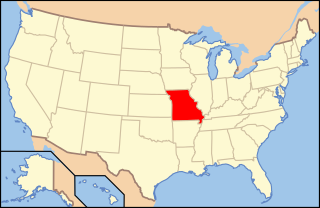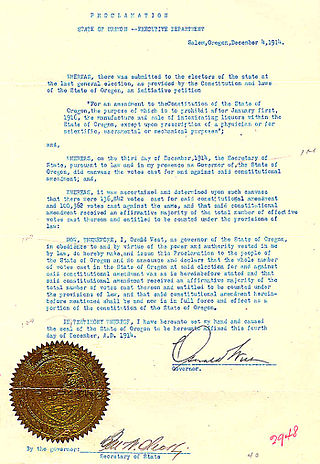Related Research Articles

Prohibition is the act or practice of forbidding something by law; more particularly the term refers to the banning of the manufacture, storage, transportation, sale, possession, and consumption of alcoholic beverages. The word is also used to refer to a period of time during which such bans are enforced.

Oklahoma allows any establishment with a beer and wine license to sell beer and wine up to 15% ABV, under refrigeration.

The alcohol laws of Missouri are among the most permissive in the United States. Missouri is known throughout the Midwest for its largely laissez-faire approach to alcohol regulation, in sharp contrast to the very strict alcohol laws of some of its neighbors, like Kansas and Oklahoma.

The alcohol laws of Kansas are among the strictest in the United States, in sharp contrast to its neighboring state of Missouri, and similar to its other neighboring state of Oklahoma. Legislation is enforced by the Kansas Division of Alcoholic Beverage Control.

Alcohol laws of New York are a set of laws specific to manufacturing, purchasing, serving, selling, and consuming alcohol in the state of New York. Combined with federal and local laws, as well as vendor policies, alcohol laws of New York determine the state's legal drinking age, the driving under the influence limit, liquor license requirements, server training, and more.

The alcohol laws of Pennsylvania contain many peculiarities not found in other states, and are considered some of the strictest regulations in the United States.
Alcohol laws of West Virginia are more complex on paper than in actual practice, owing to a provision of the state constitution and "work-arounds" of its terms.
Alcohol laws of Maryland vary considerably by county, due to the wide latitude of home rule granted to Maryland counties.

The U.S. state of Oregon has an extensive history of laws regulating the sale and consumption of alcoholic beverages, dating back to 1844. It has been an alcoholic beverage control state, with the Oregon Liquor and Cannabis Commission holding a monopoly over the sale of all distilled beverages, since Prohibition. Today, there are thriving industries producing beer, wine, and liquor in the state. Alcohol may be purchased between 7 a.m. and 2:30 a.m for consumption at the premise it was sold at, or between 6 a.m. and 2:30 a.m. if it is bought and taken off premise. In 2020, Oregon began allowing the sale of alcohol via home delivery services. As of 2007, consumption of spirits was on the rise while beer consumption held steady. That same year, 11% of beer sold in Oregon was brewed in-state, the highest figure in the United States.

The state laws governing alcoholic drinks in New Jersey are among the most complex in the United States, with many peculiarities not found in other states' laws. They provide for 29 distinct liquor licenses granted to manufacturers, wholesalers, retailers, and for the public warehousing and transport of alcoholic drinks. General authority for the statutory and regulatory control of alcoholic drinks rests with the state government, particularly the Division of Alcoholic Beverage Control overseen by the state's Attorney General.
Alcohol laws of Australia are laws that regulate the sale and consumption of alcoholic beverages. The legal drinking age is 18 throughout Australia. The minimum age for the purchase of alcoholic products in Australia is 18. A licence is required to produce or sell alcohol.

Alcohol laws are laws relating to manufacture, use, being under the influence of and sale of alcohol or alcoholic beverages. Common alcoholic beverages include beer, wine, (hard) cider, and distilled spirits. Definition of alcoholic beverage varies internationally, e.g., the United States defines an alcoholic beverage as "any beverage in liquid form which contains not less than one-half of one percent of alcohol by volume". Alcohol laws can restrict those who can produce alcohol, those who can buy it, when one can buy it, labelling and advertising, the types of alcoholic beverage that can be sold, where one can consume it, what activities are prohibited while intoxicated, and where one can buy it. In some cases, laws have even prohibited the use and sale of alcohol entirely.

The serving of alcohol in the Commonwealth of Massachusetts is governed by the Alcoholic Beverages Control Commission (ABCC), which is responsible for issuing licenses and permits for all manufacturers, wholesalers and importers, out-of-state suppliers, brokers, salespeople, warehouses, planes, trains, ships, ship chandlers and vehicles transporting alcoholic beverages.
The legal drinking age in India and the laws which regulate the sale and consumption of alcohol vary significantly from state to state. In India, consumption of alcohol is prohibited in the states of Bihar, Gujarat, Nagaland, and Mizoram, as well as the union territory of Lakshadweep. There is partial ban on alcohol in some districts of Manipur. All other Indian states permit alcohol consumption but fix a legal drinking age, which ranges at different ages per region. In some states the legal drinking age can be different for different types of alcoholic beverage.
The alcohol laws of South Carolina are part of the state's history. Voters endorsed prohibition in 1892 but instead were given the "Dispensary System" of state-owned liquor stores. Currently, certain counties may enforce time restrictions for beer and wine sales in stores, although there are no dry counties in South Carolina.
Blue laws, also known as Sunday laws, are laws that restrict or ban some or all activities on specified days, particularly to promote the observance of a day of rest. Such laws may restrict shopping or ban sale of certain items on specific days. Blue laws are enforced in parts of the United States and Canada as well as some European countries, particularly in Austria, Germany, Switzerland, and Norway, keeping most stores closed on Sundays.
The alcohol laws of Maine regulate the sale and possession of alcohol in the state of Maine in the United States. Maine is an alcoholic beverage control state.

A person must be at least 15-17 years of age to publicly drink an alcoholic beverage in Texas, with some exceptions
References
- 1 2 Ranney, Joseph A. (July 1, 1999). "Aliens and "Real Americans": Law & Ethnic Assimilation in Wisconsin, 1846-1920". Trusting Nothing to Providence: A History of Wisconsin's Legal System. Madison, WI: University of Wisconsin Law School. ISBN 978-0910587495.
- ↑ Sahr, Robert C. (2008). "Consumer Price Index (CPI) Conversion Factors 1774 to estimated 2019 to Convert to Dollars of 2007" (PDF). Oregon State University. Archived from the original on July 9, 2009.
{{cite web}}: CS1 maint: unfit URL (link) - ↑ Ranney, Joseph A. "Demon rum and Sunday lager: The temperence movemenet (sic) in Wisconsin". Wisconsin Court System.
- ↑ "Brewing and Prohibition". Wisconsin Historical Society.
- ↑ "Alcohol Policy in Wisconsin History" (PDF). Wisconsin Alcohol Policy Project. University of Wisconsin Law School. July 29, 2013.
- ↑ Bauer, Scott (May 1, 2023). "Bill would allow 14-year-olds to serve alcohol in Wisconsin". AP News . Retrieved June 8, 2023.
- ↑ "Information for Wisconsin Alcohol Beverage and Tobacco Retailers" (PDF). Wisconsin Department of Revenue. October 6, 2021. Retrieved April 3, 2023.
- 1 2 3 "Wisconsin Alcohol Beverage and Tobacco Laws for Retailers" (PDF). Wisconsin Department of Revenue. May 2008.
- 1 2 "Wis. Stat. 125.05" (PDF). Wisconsin State Legislature.
- ↑ "Referendum on beer, alcohol sales fails". La Crosse Tribune. April 6, 2011. p. B2.
- ↑ Hubbuch, Chris (April 8, 2009). "Sparta again says no to alcohol sales". La Crosse Tribune .
- ↑ "A Brief History of Ephraim". Village of Ephraim. Archived from the original on June 9, 2011.
{{cite web}}: CS1 maint: unfit URL (link) - ↑ "Resolution 06-247". City of Oshkosh, Wisconsin. July 25, 2006.
- ↑ Lake, Brittany (April 1, 2014). "Voters approve Sparta beer sales". WXOW. Archived from the original on November 7, 2014. Retrieved April 2, 2014.
- ↑ Hernandez, Samantha (April 5, 2016). "Ephraim dry no more". Green Bay Press-Gazette.
- ↑ "Wisconsin State Statutes section 125.07(1)". Wisconsin State Statutes. Retrieved January 21, 2014.
- ↑ "Wisconsin Department of Revenue" . Retrieved February 10, 2019.
- 1 2 "Brief 95-3: The Minimum Drinking Age in Wisconsin" (PDF). Wisconsin Legislative Reference Bureau. Archived from the original on February 19, 2012.
{{cite web}}: CS1 maint: unfit URL (link) - 1 2 3 "OWI AND RELATED ALCOHOL AND DRUG OFFENSE PENALTIES (AS OF OCTOBER 1, 2020)" (PDF).